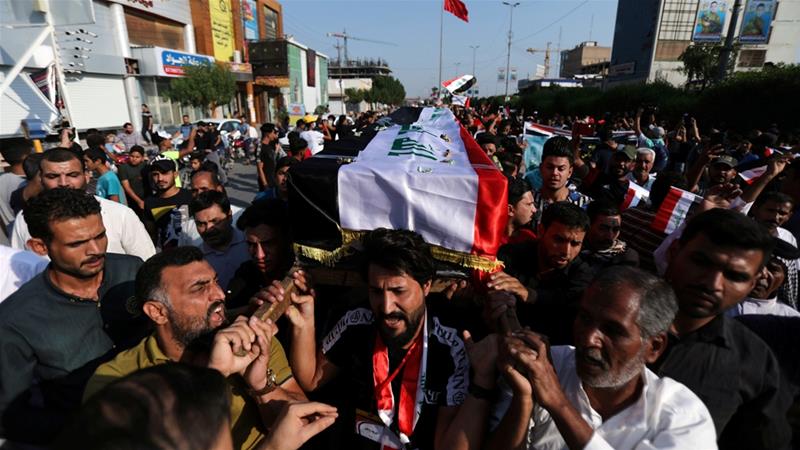12 demonstrators killed, dozens injured in Baghdad after unknown men attack
4 min read
BAGHDAD: Twelve demonstrators were killed and dozens wounded late on Friday after unidentified men attacked an anti-government protest camp in Baghdad, marking a new violent turn for the anti-government movement.
The bloodshed came as the US accused Iran of “meddling” in Iraq’s turmoil and slapped sanctions on Iran-backed groups for allegedly cracking down on protesters.
Youth-dominated allies have thronged the Iraqi capital’s main protest camp in Tahrir Square since early October, denouncing the government as corrupt, inept and beholden to Iran.
There were fears this week of a potential spiral into chaos after supporters of the Hashed al-Shaabi security force flexed their muscles by flooding the square.
On Friday, rallies began peacefully but veered into violence when night fell, witnesses told AFP.
Armed men on pick-up trucks attacked a large building where protesters had been camped out for weeks, forcing them out amid volleys of gunfire.
At least 12 people were shot dead and dozens of others wounded, medics told AFP, expecting the toll could rise further.
Ambulances ferried protesters with gunshot and stab wounds from the building that had been taken over to protest tents fitted out as field clinics, witnesses said.
Young volunteer medics dabbed at the bloodied wounds with cotton to clean them while the teenage protesters grimaced in pain.
One female medic at a field clinic nearby said she had treated at least five people for light knife wounds.
US slaps new sanctions:
After the attack, dozens of young men could be seen rushing away of the building in a panic, jumping over concrete barriers to the relative safety of Tahrir.
The new deaths bring the toll to 440 dead and 20,000 wounded since anti-government rallies erupted on October 1 in Baghdad and the country’s south.
The grassroots movement is Iraq’s deadliest in decades, with security forces trying to snuff out demonstrations with military-grade tear gas canisters, live rounds and even machine guns.
On Friday, the US imposed sanctions on three Iraqi paramilitary leaders it accused of involvement in the deadly crackdown.
They included Qais al-Khazali, leader of the Hashed’s prominent Asaib Ahl al-Haq brigade, and Hussein Falil Aziz al-Lami, who heads the network’s powerful security apparatus.
Another Hashed leader, Laith al-Khazali, was also named.
The measures would seize any assets they have in the US and keep them from travelling there.
The Hashed initially backed Iraq’s government against the protests, but switched sides after an intervention by the country’s top cleric, Grand Ayatollah Ali Sistani.
Sistani urged parliament last week to drop support for the current government in a major turning point that led to the resignation of Prime Minister Adel Abdel Mahdi.
The Hashed began publicly backing the rallies and its supporters streamed into Tahrir in the thousands on Thursday.
Rallies see new faces:
Protesters were apprehensive about the sudden influx and on Friday erected new checkpoints around the square to search Iraqis arriving in Tahrir.
The daytime rallies were peaceful, attracting hundreds of clerics and officials from shrines in Baghdad, Karbala, Najaf and other cities.
With robed clerics in white turbans leading the way, a procession circled through Tahrir, and one protester told AFP their presence made it less likely the rallies would descend into clashes.
“The religious shrines’ involvement grants legitimacy and numbers to the protests,” said Thaer Istayfi, 41.
Protesters had long complained of being monitored in Tahrir, fearing it would lead to kidnapping, or worse.
On Friday, relatives of Zeid al-Khafaji, a 22-year-old photographer, said he had been abducted whilst returning from Tahrir.
That came after the bruised body of 19-year-old Zahra Ali was left outside her family home hours after she went missing, her father said.
Iran interferes?
A deadly crackdown last week snowballed into a dramatic intervention by Sistani that prompted Abdel Mahdi’s resignation.
During this week’s Friday sermon, Sistani insisted the religious leadership was not involved in finding a new PM.
“The marjaiyah is not party to any discussions on this and has no role in any way whatsoever,” he said, in a sermon read by his representative in the shrine city of Karbala.
He did however urge that a new premier be selected within 15 days, as per the constitution, and with no “foreign interference.”
His words appeared to be a warning to Iran, which has tremendous sway among Iraq’s political and military class.
Tehran’s pointman in Iraq, Major General Qasem Soleimani, has traveled to Baghdad repeatedly during the protests and is involved in meetings to field candidates for the premiership, a senior political source told AFP.
His presence was denounced as “a huge violation of Iraqi sovereignty” by David Schenker, the top US diplomat for the Middle East. Agencies

